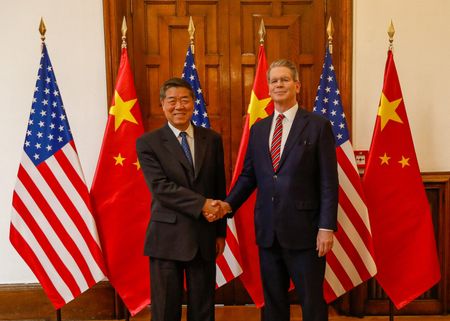BEIJING (Reuters) -China’s fiscal revenue continued to decline in the first four months of the year, but at a slower pace than in the first quarter, data showed on Tuesday, offering some relief to policymakers striving to mitigate the impact of U.S. tariffs.
Fiscal revenue in the January-April period totalled 8.06 trillion yuan ($1.12 trillion), down 0.4% year-on-year, data from the finance ministry showed on Tuesday. That was an improvement from a 1.1% fall in the first three months of the year.
China’s economy has been clouded by challenges including a protracted property downturn, debt risks, weak business and consumer sentiment and trade friction with the U.S.
Despite a better-than-expected export performance in the face of the U.S. tariff hit, other economic indicators in April have shown a mixed picture of the economy, with factory-gate prices posting the steepest drop in six months, pointing to persistent deflationary pressure.
Tuesday’s data showed China’s tax revenue fell 2.1% in the January-April period from the previous year, but that non-tax revenue surged 7.7%.
Fiscal expenditure posted a 4.6% gain on year in the first four months, compared with a 4.2% rise in the first quarter, amid robust government spending.
As external uncertainties rise, policymakers have made expanding domestic demand the top priority this year as they try to soften the impact of the Trump administration’s tariffs on its crucial export engine.
To cushion the economic damage caused by tariffs, Beijing announced a raft of monetary stimulus measures earlier this month, including interest rate cuts and a major injection of liquidity.
The announcement came before the China-U.S. trade detente was reached after high-stakes talks in Geneva, marking a significant de-escalation from months of mounting tensions.
Some brokerages have upgraded their forecasts on China’s 2025 economic growth, indicating Beijing might be under less pressure to roll out stimulus measures.
($1 = 7.2199 Chinese yuan renminbi)
(Reporting by Ellen Zhang, Shi Bu and Ryan Woo; Editing by Andrew Heavens and Conor Humphries)










